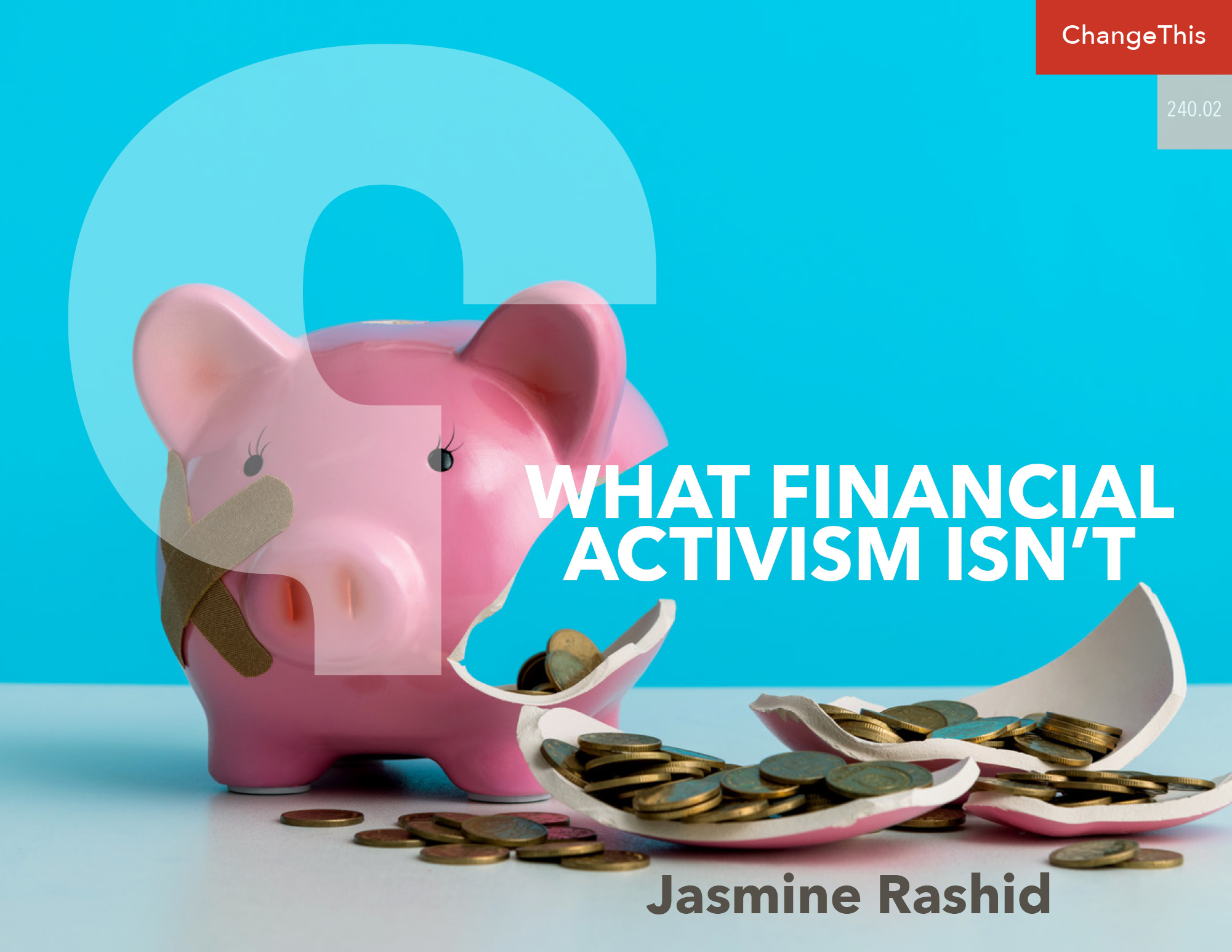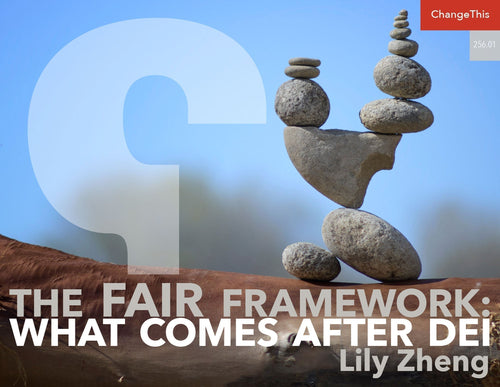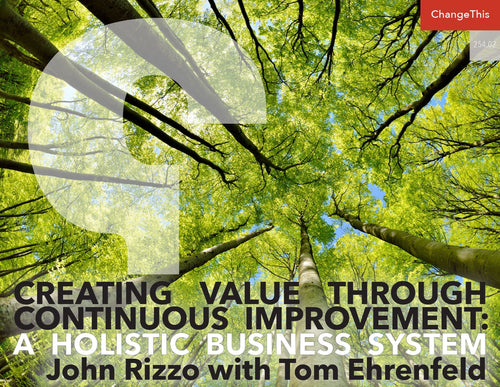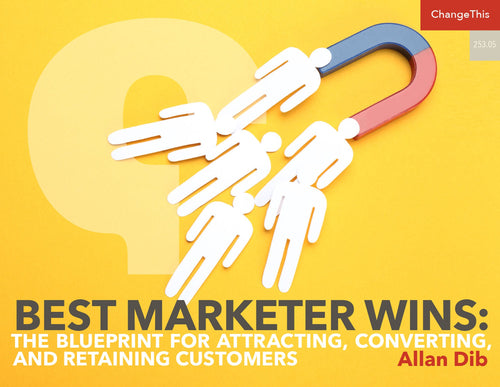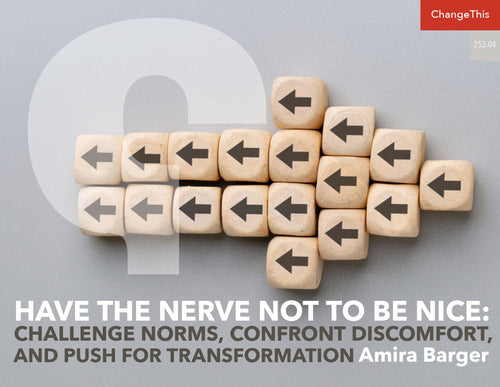What Financial Activism Isn’t
There’s a good chance you aren’t yet familiar with the term “financial activism,” but I’m also willing to bet you can make some assumptions. In the broadest sense, financial activism is the work of shifting the flow of capital and power: resisting systems that cause harm to people and the planet for the sake of profit, and redesigning our relationships to money and one another. In other words — all of us, whether we know it or not, are already making big and small decisions relevant to the movement to build a more just economy. There’s power in knowing our power.
Over the past few years researching for my book The Financial Activist Playbook, I’ve had the privilege of expanding my own conception of what’s possible in this realm of creatively reclaiming and remixing strategies for collective wealth-building and well-being. And those possibilities only continue to expand: I’ve seen everyday people start credit unions from barbershops, influence billions of dollars away from the private prison industry, find lasting community in giving circles, and so much more that makes my heart swell with admiration.
And, I’ve seen my fair share of misconceptions and whitewashing around financial activism. So let’s take a moment to review some common myths and set the record straight, shall we?
Myth 1: Only Rich People or Elected Government Officials Get to Decide How and Where Money Flows
I detest this unspoken assumption so much that if it were written on a piece of paper, I’d ball it up and shoot it like Steph Curry from the three-point line into a trash can. Then set the trash can on fire.
It’s true that some decisions, under the big tent of economic decision-making, require buy-in from those in traditional positions of power, such as bank executives and politicians. But we’re focusing here specifically on financial activism because it’s an effective tool for everyday people, compared to other forms of “economic activism”, like “monetary activism” (the use of central bank policies, such as interest rate adjustments, to influence a country’s money supply and economic conditions) or “fiscal activism” (involving government actions to manipulate tax and spending policies to stimulate or control a nation’s economy).
Financial activism is a tool for everyday people, about the experiences of everyday people.
Myth 2: Financial Activism Means Hating or Loving Money
Money is, in and of itself, a neutral tool. Not a good worth celebrating, nor an evil worth hating.
As social beings, we have the funny tendency to animate money, imbuing it with the power to join us in torrid affairs, inducing feelings of stress, intoxication, insatiability, and so on. To be sure, the effects of money do often show up as high drama, and understandably so. Drama abounds at all levels. From absence (as in the case of an uninsured medical emergency) to presence (as in the case of budgeting for long-term plans) to abundance (as in the case of a billionaire cheating on his wife and then, in the wake of their divorce, she flexes on him by giving away more in philanthropy than he ever did; yes, I’m talking about MacKenzie Scott—hey girl).
But money alone—think a literal dollar gently floating out of one’s palm to the ground—is just a thing. In the same way money can ruin lives, it can be medicine for healing and wholeness when intentionally liberated from a culture of violence and extraction. It can be used as a vehicle for returning what’s been stolen, a tool for restoring what’s been harmed, and, of course, a kind of alchemy for creating brand-new value and beauty in the world.
Financial activism positions the use of money as a strategic means to an end, or one ingredient in the recipe (albeit a major ingredient… like, please don’t forget to salt the chicken). For generations, money has been a resource that systems have concentrated into the hands of a few while making it disproportionately challenging to grasp for many others — and it doesn’t deserve our passion, one way or another.
Instead, our passion is more useful in fundamentally reimagining the people and systems responsible for how money moves.
Myth 3: Financial Activism = Financial Literacy
Typically, when people say “financial literacy,” they’re referring to an individual’s knowledge and understanding of financial concepts and personal practices.
I appreciate the people who take to social media platforms and share thirty-second personal finance hacks, like clever ways to increase your savings, how to max out your IRA and get the biggest bang for your buck, or how to diversify by investing in ETFs. For so many content creators, their firsthand experiences—like mounting student debt and housing costs—fuel their desire to democratize access to long-secretive financial knowledge.
So, what’s the difference between this kind of work and what we’re talking about? To me, financial activism is the cool, more radical cousin of financial literacy. Rather than focus on an individual’s money like financial literacy does (how do I balance my checkbook?), financial activism zooms out and works to also improve collective financial health (how do we balance society?).
“For decades, financial education has been taught from a place of shame, guilt, and judgment, hardly ever considering the systemic issues, past and present, that have made it difficult for minorities to get ahead,” shares Dasha Kennedy, founder of @thebrokeblackgirl. “Financial activism bridges the gap between equity and financial education.”
Financial activism, at its best, is an antidote to a financial system that’s inaccessible, convoluted, and inequality-producing by design. It’s not just about learning how to navigate the system; it’s also about changing the system to work for us so that we no longer need to tips-and-tricks our way out of precarious financial situations in the first place.
As I hope my work will continue to remind you, these two concepts of you winning and your community winning can be one and the same.
Myth 4: Financial Activism Requires Becoming a Financial “Expert”
In my day job being a Big Nerd, I help my team and our clients invest hundreds of millions of dollars into social impact companies and funds. This is true. In my everyday life, I also experience a spike in stress when the bill comes and I pull out my phone to calculate the tip because #mathanxiety.
We contain multitudes.
For some, becoming a finance professional is a walk in the park (and a joyful walk with birds singing and all that, not a scary after-dark walk). For others, me included, our brains don’t even particularly like the word finance.
That’s okay. In fact, people who are financial professionals and experts don’t have an inherent learning curve advantage here. That’s because their journeys with financial activism often necessitate significant unlearning of harmful norms endemic to traditional finance.
As with all movement progress, the most effective efforts and ideas happen because of diverse perspectives coming together. Remember: finance wonks, longtime climate and racial justice advocates, and everyday people just out here living all have a unique role to play in shaping the economy we share.
Myth 5: All We Need Is Financial Activism!
Let me stop you there.
Financial activism can help fund storytellers to do the work of changing hearts and minds. It can support the ways in which laws are made and policies are adopted. It can limit bad actors from screwing over everyday people. Using financial insights and skill sets to reclaim and redistribute resources is critical, but it’s by no means the only tool we need to be leveraging in our hefty organizing toolbelt if we want meaningful, lasting change. The role of this Playbook is to help you discern what, when, and how to move money in service of achieving collective goals.
Money is not always the answer. I said what I said.
Myth 6: More Diversity in Our Financial Systems Would Fix Everything
Changing the players without changing the game is a losing strategy. A common false solution that we see branded as “activism” is diversity, equity, and inclusion (DEI) efforts to make our current inequality-producing machines just more “diverse” at the top. Must we remind ourselves that exploitation by women and people of color is still exploitation?
Financial activism is about fundamentally challenging a financial system that deems winners take all and the rest can perpetually kick rocks. It’s about supporting the emergence of a financial system that allows all of us to truly thrive, given the reality of financial abundance available in the richest period, in the richest nations, in the history of the world. It’s about reversing trends of the last fifty years, where $50 trillion in wealth has been stolen from the bottom 90 percent of the population by the top 1 percent of the population, through very explicit financial engineering (more on this coming up).
I promise to refrain from caricaturing billionaires as greedy dragons sitting atop mounds of gold they’ll never use, but I won’t compromise on the position that having a system that allows anyone to become a billionaire in the first place is more damaging and absurd than it is potentially helpful. Let’s imagine that scale of wealth in time. One million minutes is the equivalent of a little less than two years. One billion minutes? One thousand, nine hundred four years. No one needs 1,904 years’ worth of minutes. The difference between a billion and a million is bigger than our brains can often comprehend.
The richest 1 percent — who own almost half of the world’s wealth — are a natural target for financial activism. That said, we’re not here to spend time and energy hating on anyone who’s financially flourishing, especially those who a) come from communities where wealth is not guaranteed, and b) made their wealth in non-exploitative ways. Progressive-branded blanket characterizations of just “rich people” as the problem is often
- a distraction to focus on individual bad actors, rather than on the more powerful underlying problems of bad systems;
- reinforcing the myth that we must live in a “zero-sum” system, where one person’s gain must equal another person’s loss;
- lacking nuance and at odds with the principle of dignity for all; and
- played out.
So, let’s summarize. Romanticizing billionaires without considering where the wealth came from? Not financial activism.
Booing people when they indulge in a nice vacation or spa day while there’s still inequality in the world? Weird, and not financial activism.
Using knowledge of financial workings to shift resources into disinvested and historically exploited communities so more people can build wealth and live their most unencumbered lives? Ding ding ding—financial activism!
The system our work aims to shift is the extreme resource concentration that leads to unnecessary, manmade levels of poverty, hunger, and suffering. We could spend the next two hundred pages together laying out different macroeconomic models and philosophical theories, but I’m filing that under “not my job.”
I also know (sorry, all my very smart academic and pedagogy-disciplined friends and colleagues whom I love so much!) that most people don’t really care. They care about sustaining themselves, their families, and their people. They’re interested in enjoying life and experiencing a semblance of fairness. They want to live in a society where everybody eats.
That’s the “radical” economy my work aims to support us ushering in within our lifetimes.
As defined by Angela Davis, “radical simply means grabbing by the root.”
Adapted from The Financial Activist Playbook: 8 Strategies for Everyday People to Reclaim Wealth and Collective Well-Being by Jasmine Rashid, published by Berrett-Koehler Publishers. Copyright © 2024 by Jasmine Rashid.

